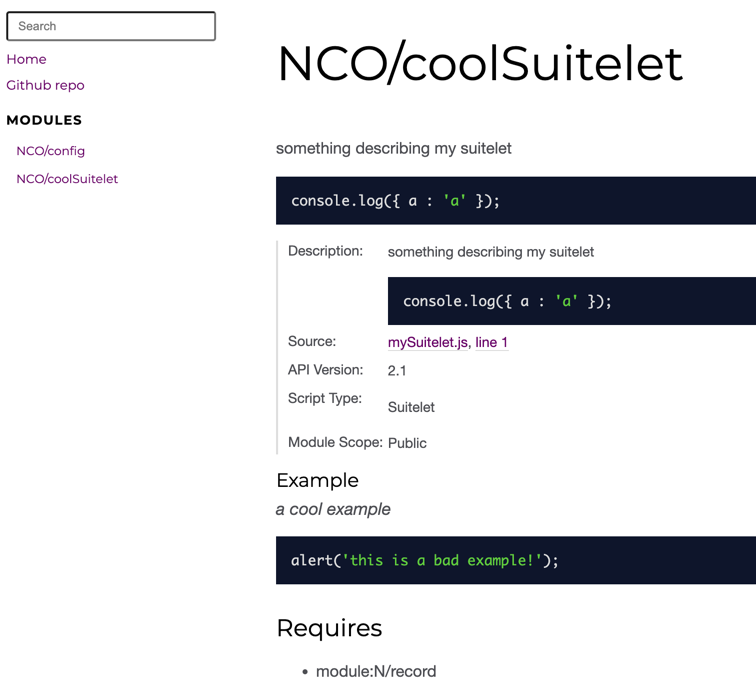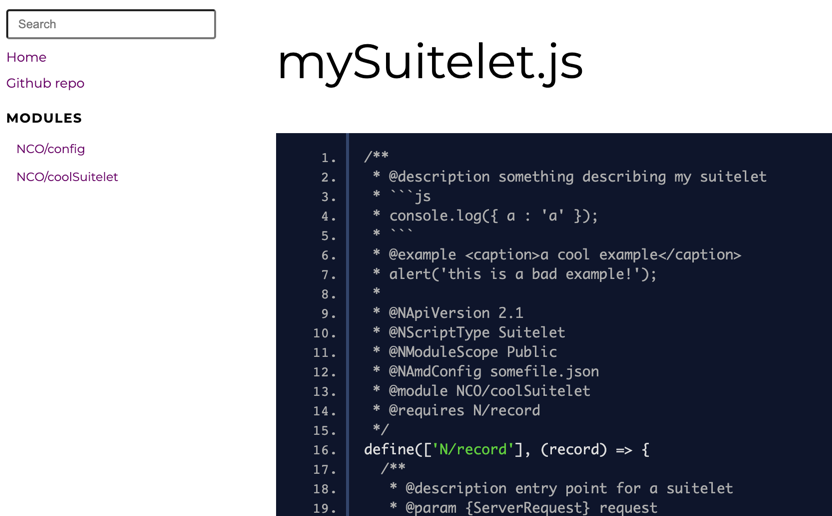Docdash but enhanced:
- to recognize SuiteScript's JsDoc tags
- Support for basic custom tags
- NApiVersion
- NModuleScope
- NScriptType
- NAmdConfig
- governance - arbitrary
- appliestorecord - arbitrary
You will need to:
- inform jsdoc of these tags by adding the following in your jsdoc config plugins.
"plugins": ["@suitegeezus/docdash-suitescript/ssTags"]- inform jsdoc you are using this template. Here is a js example:
const template = path.dirname(require.resolve('@suitegeezus/docdash-suitescript'));
// other code and config here
Object.assign( jsdocConfig.opts, {template }); Displaying custom tags in docs is usually the easy part but getting it into the template is difficult. So this will do basic support of custom tags.
- In your jsdoc
conf.jsonfile add a new key/sectionsuitescript. - Add a key for
basicTagsand give it an array of strings (must be valid key strings) e.g.
"suitescript": {
"basicTags": ["kwyjibo", "boom"]
}All you have to do is create a script with a few lines and put it somewhere jsdoc can find.
- Write a script (e.g.
customTags.js) that contains something like this:
// customTags.js
exports.defineTags = function (dictionary) {
dictionary.defineTag('kwyjibo', {
'mustHaveValue': true,
canHaveType : false,
canHaveName : false,
'onTagged' : function (doclet, tag) {
doclet.kwijibo = tag.value;
if (!doclet.meta) {
doclet.meta = {};
}
if (!doclet.meta.customTagName){
doclet.meta.customTagName = [];
}
// the customTagName must match the doclet key and tag above
doclet.meta.customTagName.push('kwyjibo')
}
})
// optional synonym
.synonym('mycustom');
}; - put this script somewhere jsdoc can see it. (probably easiest thing would be to copy it to the jsdoc/plugins folder)
- Refer to this script via plugins (in your jsdoc.conf)
"plugins": ["@suitegeezus/docdash-suitescript/ssTags", "from/a/root/jsdoc/can/resolve/customTags"]A clean, responsive documentation template theme for JSDoc 3.
See http://clenemt.github.io/docdash/ for a sample demo. 🚀
$ npm install docdashClone repository to your designated jsdoc template directory, then:
$ jsdoc entry-file.js -t path/to/docdashIn your projects package.json file add a new script:
"script": {
"generate-docs": "node_modules/.bin/jsdoc -c jsdoc.json"
}In your jsdoc.json file, add a template option.
"opts": {
"template": "node_modules/docdash"
}See the config file for the fixtures or the sample below.
{
"tags": {
"allowUnknownTags": false
},
"source": {
"include": "../js",
"includePattern": "\\.js$",
"excludePattern": "(node_modules/|docs)"
},
"plugins": [
"plugins/markdown"
],
"opts": {
"template": "assets/template/docdash/",
"encoding": "utf8",
"destination": "docs/",
"recurse": true,
"verbose": true
},
"templates": {
"cleverLinks": false,
"monospaceLinks": false
}
}Docdash supports the following options:
{
"docdash": {
"static": [false|true], // Display the static members inside the navbar
"sort": [false|true], // Sort the methods in the navbar
"sectionOrder": [ // Order the main section in the navbar (default order shown here)
"Classes",
"Modules",
"Externals",
"Events",
"Namespaces",
"Mixins",
"Tutorials",
"Interfaces"
],
"disqus": "", // Shortname for your disqus (subdomain during site creation)
"openGraph": { // Open Graph options (mostly for Facebook and other sites to easily extract meta information)
"title": "", // Title of the website
"type": "website", // Type of the website
"image": "", // Main image/logo
"site_name": "", // Site name
"url": "" // Main canonical URL for the main page of the site
},
"meta": { // Meta information options (mostly for search engines that have not indexed your site yet)
"title": "", // Also will be used as postfix to actualy page title, prefixed with object/document name
"description": "", // Description of overal contents of your website
"keyword": "" // Keywords for search engines
},
"search": [false|true], // Display seach box above navigation which allows to search/filter navigation items
"commonNav": [false|true], // Group all html code for <nav> in a nav.inc.html fetched on each page (instead of include it in each html page, save {navSize}×{nb html pages} which can be huge on big project)
"collapse": [false|true], // Collapse navigation by default except current object's navigation of the current page
"wrap": [false|true], // Wrap long navigation names instead of trimming them
"typedefs": [false|true], // Include typedefs in menu
"navLevel": [integer], // depth level to show in navbar, starting at 0 (false or -1 to disable)
"private": [false|true], // set to false to not show @private in navbar
"removeQuotes": [none|all|trim],// Remove single and double quotes, trim removes only surrounding ones
"scripts": [], // Array of external (or relative local copied using templates.default.staticFiles.include) js or css files to inject into HTML,
"menu": { // Adding additional menu items after Home
"Project Website": { // Menu item name
"href":"https://myproject.com", //the rest of HTML properties to add to manu item
"target":"_blank",
"class":"menu-item",
"id":"website_link"
},
"Forum": {
"href":"https://myproject.com.forum",
"target":"_blank",
"class":"menu-item",
"id":"forum_link"
}
},
"scopeInOutputPath": [false|true], // Add scope from package file (if present) to the output path, true by default.
"nameInOutputPath": [false|true], // Add name from package file to the output path, true by default.
"versionInOutputPath": [false|true] // Add package version to the output path, true by default.
}
}Place them anywhere inside your jsdoc.json file.
Licensed under the Apache License, version 2.0. (see Apache-2.0).













